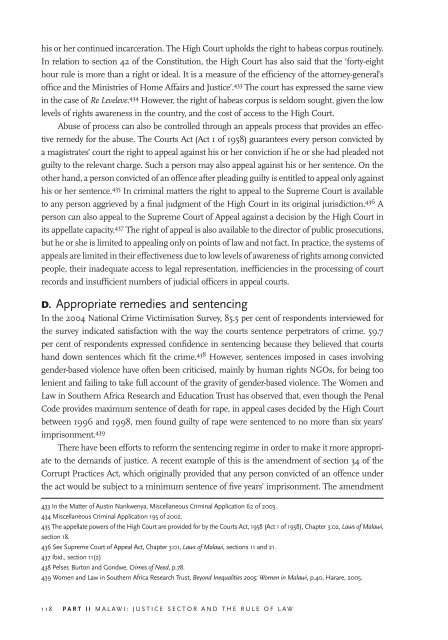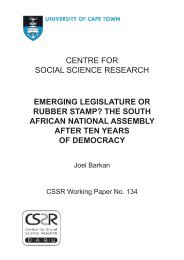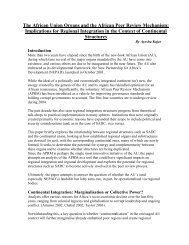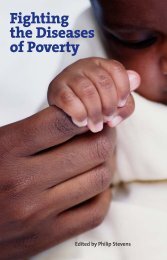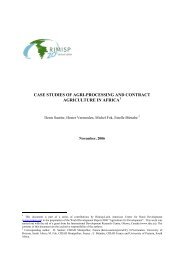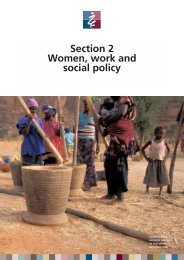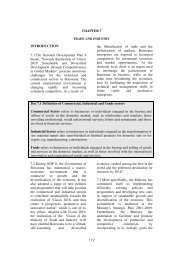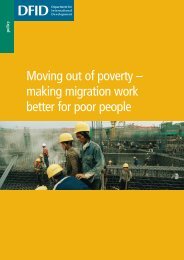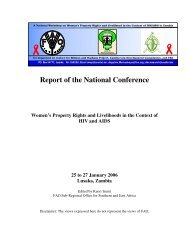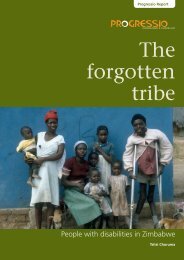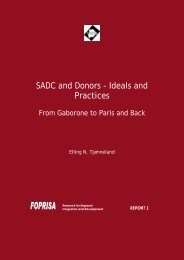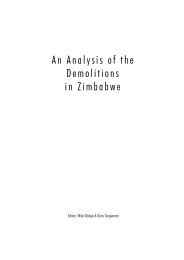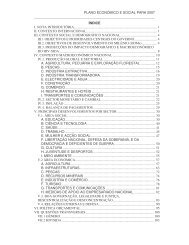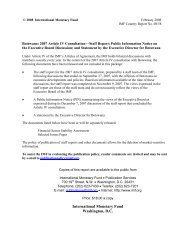Justice Sector and the Rule of Law - AfriMAP
Justice Sector and the Rule of Law - AfriMAP
Justice Sector and the Rule of Law - AfriMAP
You also want an ePaper? Increase the reach of your titles
YUMPU automatically turns print PDFs into web optimized ePapers that Google loves.
his or her continued incarceration. The High Court upholds <strong>the</strong> right to habeas corpus routinely.In relation to section 42 <strong>of</strong> <strong>the</strong> Constitution, <strong>the</strong> High Court has also said that <strong>the</strong> ‘forty-eighthour rule is more than a right or ideal. It is a measure <strong>of</strong> <strong>the</strong> efficiency <strong>of</strong> <strong>the</strong> attorney-general’s<strong>of</strong>fice <strong>and</strong> <strong>the</strong> Ministries <strong>of</strong> Home Affairs <strong>and</strong> <strong>Justice</strong>’. 433 The court has expressed <strong>the</strong> same viewin <strong>the</strong> case <strong>of</strong> Re Leveleve. 434 However, <strong>the</strong> right <strong>of</strong> habeas corpus is seldom sought, given <strong>the</strong> lowlevels <strong>of</strong> rights awareness in <strong>the</strong> country, <strong>and</strong> <strong>the</strong> cost <strong>of</strong> access to <strong>the</strong> High Court.Abuse <strong>of</strong> process can also be controlled through an appeals process that provides an effectiveremedy for <strong>the</strong> abuse. The Courts Act (Act 1 <strong>of</strong> 1958) guarantees every person convicted bya magistrates’ court <strong>the</strong> right to appeal against his or her conviction if he or she had pleaded notguilty to <strong>the</strong> relevant charge. Such a person may also appeal against his or her sentence. On <strong>the</strong>o<strong>the</strong>r h<strong>and</strong>, a person convicted <strong>of</strong> an <strong>of</strong>fence after pleading guilty is entitled to appeal only againsthis or her sentence. 435 In criminal matters <strong>the</strong> right to appeal to <strong>the</strong> Supreme Court is availableto any person aggrieved by a final judgment <strong>of</strong> <strong>the</strong> High Court in its original jurisdiction. 436 Aperson can also appeal to <strong>the</strong> Supreme Court <strong>of</strong> Appeal against a decision by <strong>the</strong> High Court inits appellate capacity. 437 The right <strong>of</strong> appeal is also available to <strong>the</strong> director <strong>of</strong> public prosecutions,but he or she is limited to appealing only on points <strong>of</strong> law <strong>and</strong> not fact. In practice, <strong>the</strong> systems <strong>of</strong>appeals are limited in <strong>the</strong>ir effectiveness due to low levels <strong>of</strong> awareness <strong>of</strong> rights among convictedpeople, <strong>the</strong>ir inadequate access to legal representation, inefficiencies in <strong>the</strong> processing <strong>of</strong> courtrecords <strong>and</strong> insufficient numbers <strong>of</strong> judicial <strong>of</strong>ficers in appeal courts. In <strong>the</strong> 2004 National Crime Victimisation Survey, 85.5 per cent <strong>of</strong> respondents interviewed for<strong>the</strong> survey indicated satisfaction with <strong>the</strong> way <strong>the</strong> courts sentence perpetrators <strong>of</strong> crime. 59.7per cent <strong>of</strong> respondents expressed confidence in sentencing because <strong>the</strong>y believed that courtsh<strong>and</strong> down sentences which fit <strong>the</strong> crime. 438 However, sentences imposed in cases involvinggender-based violence have <strong>of</strong>ten been criticised, mainly by human rights NGOs, for being toolenient <strong>and</strong> failing to take full account <strong>of</strong> <strong>the</strong> gravity <strong>of</strong> gender-based violence. The Women <strong>and</strong><strong>Law</strong> in Sou<strong>the</strong>rn Africa Research <strong>and</strong> Education Trust has observed that, even though <strong>the</strong> PenalCode provides maximum sentence <strong>of</strong> death for rape, in appeal cases decided by <strong>the</strong> High Courtbetween 1996 <strong>and</strong> 1998, men found guilty <strong>of</strong> rape were sentenced to no more than six years’imprisonment. 439There have been efforts to reform <strong>the</strong> sentencing regime in order to make it more appropriateto <strong>the</strong> dem<strong>and</strong>s <strong>of</strong> justice. A recent example <strong>of</strong> this is <strong>the</strong> amendment <strong>of</strong> section 34 <strong>of</strong> <strong>the</strong>Corrupt Practices Act, which originally provided that any person convicted <strong>of</strong> an <strong>of</strong>fence under<strong>the</strong> act would be subject to a minimum sentence <strong>of</strong> five years’ imprisonment. The amendment


